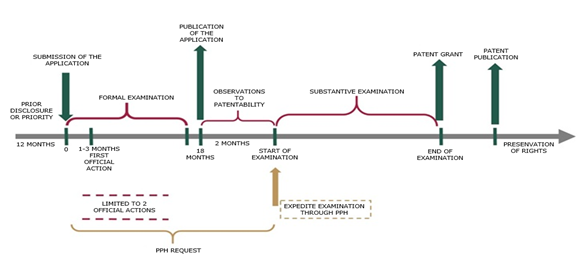By: Ana Esther Urquizo.
The Patent Prosecution Highway (PPH) seeks to streamline the substantive examination of a patent application that was also filed in one of the countries with which the Mexican Institute of Industrial Property (IMPI) has entered into a cooperation agreement of this type. It also seeks to remove duplication of work between offices.
The IMPI has signed this program with various patent offices, such as the United States Patent and Trademark Office (USPTO), the Japan Patent Office (JPO), the Spanish Patent and Trademark Office (SPTO), the Korean Intellectual Property Office (KIPO), the China National Intellectual Property Administration (CNIPA), the Canadian Intellectual Property Office (CIPO) and the Intellectual Property Office of Singapore (IPOS).
The foregoing is based on article 118 of the Federal Law for the Protection of Industrial Property, contained in chapter VI "Patent Prosecution", which establishes the following:
"Article 118.-The Institute may enter into inter-institutional agreements on patent matters, to facilitate the exchange and use of work, related to search, substantive examination or its equivalent, including technical assistance, as well as the making available of search and examination results".
To participate in the PPH program it is required -according to the provisions of the IMPI Guide on Inventions, Patents and Utility Models published in the IMPI web page on January 06, 2021-, that:
- The substantive examination of the Mexican application has not begun.
- The Mexican patent application and the application whose substantive examination serves as the basis for the accelerated patent procedure (the "corresponding application") comply with any of the relationships provided for in the relevant agreement.
- In the corresponding application there is at least one claim determined as patentable/grantable.
- All the claims of the Mexican patent application correspond to the claims determined as patentable/grantable.
A writ requesting this accelerated examination should be submitted to the IMPI after the filing of the patent application, but prior to the substantive examination. The relevant writ should include, among others, the following:
a) Copy of the relevant official actions to determine the patentability of the application, accompanied by their translation into Spanish language,
(b) Copy of the claims that have been referred to as patentable/grantable by the relevant patent office, accompanied by their translation into Spanish,
(c) References cited by the examiner, and
(d) Claim correspondence table in Spanish indicating how all the claims of the Mexican application correspond to the patentable/grantable claim(s) in the corresponding application.
The IMPI will decide whether the patent application may be subject to the PPH examination once the period of observations on the patentability of the invention has concluded. If accepted, its turn for examination will be advanced; the legal requirements should have been met, too.
If the requirements to access the PPH are not met, it is possible to re-file the petition to amend the errors pointed out by the IMPI taking into consideration the corresponding requirements. If the second petition neither complies with all the above requirements, the patent application will be subject to a normal examination, or if the second petition is filed once the substantive examination has begun, the second petition will be dismissed.
This timeline shows the steps that are followed with and without accelerated examination under the PPH. 1

Finally, in addition to the PPH, there is the Parallel Patent Grant Agreement (PPG) between the IMPI and the USPTO, the purpose of which is to contribute to the study of patent applications to expedite the corresponding procedures. Unlike the PPH, the study under the PPG does not have to be requested in writing; the exchange of information takes place between the offices. There is also a similar agreement with the European Patent Office called Reinforced Partnership (RP).
In all cases, the IMPI - in cooperation with other patent offices - seeks to speed up the substantive examinations of patents and increase the efficiency of its work.









